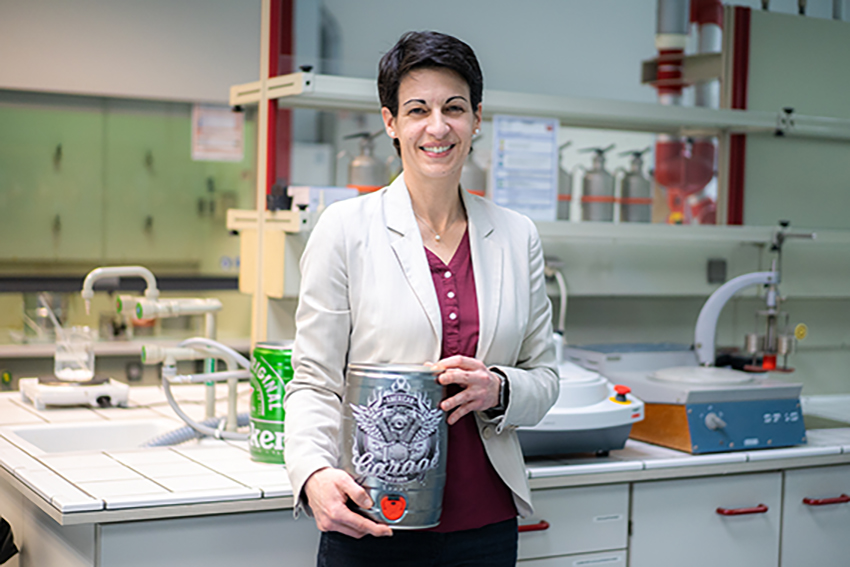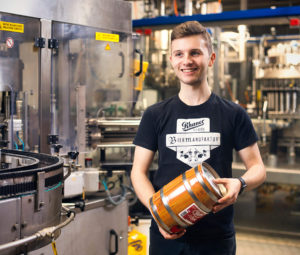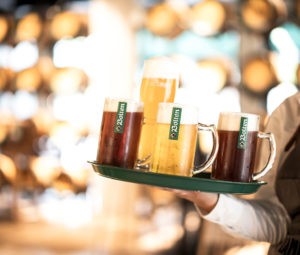Robots that independently assemble components. Cameras that notice the slightest deviation. UV light that kills germs. Filter systems that filter micro particles out of the room air. Jasmin Rehn, head of quality management at Envases Öhringen GmbH, explains how new technologies are making the minikeg ever safer.
Envases Beverage is the world market leader in minikegs. With this enormous production volume and worldwide delivery, how do you ensure the consistently high quality of your party kegs?
The quality assurance concept at Envases Beverage is multi-layered and is not limited purely to quality checks on the product during production. Even when selecting our suppliers for the required raw materials, we attach great importance to quality and reliability.
The raw materials such as tinplate and plastics come from different suppliers worldwide. What influence do the selection and control of the raw materials have on the quality of the end product?
The influence of the raw materials is quite important for the quality of the end product, because only with high quality raw materials as an input variable in our process, a qualitatively perfect end product can be achieved at the end. We therefore attach great importance to reliable and long-term cooperation with our suppliers.
External laboratories check for microbiological safety
Microbiological testing is an important part of quality and safety checks in the food sector. How does Envases Beverage implement them?
In the area of food production, the avoidance of microbiological contamination is immensely important. But for Envases as a packaging manufacturer, the focus is also on microbiology, since the packaging comes into direct contact with the food. Fortunately, the metal packaging with all its associated raw materials does not provide a breeding ground for the growth of bacteria or other microbiological pathogens. Nevertheless, the components used by Envases to manufacture the PartyKeg are treated with UV light during production prior to installation to kill any microbiological contaminants that may be present on the surfaces. The effectiveness of these systems is regularly checked by swabbing. Here we work closely with external analytical laboratories.
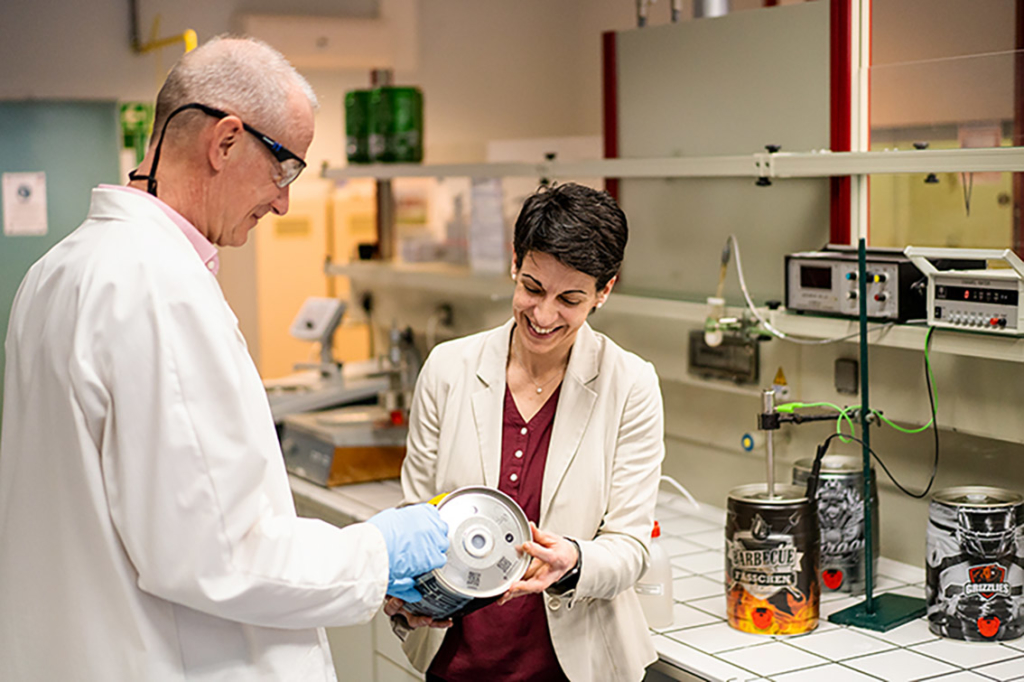
Jasmin Rehn during the quality check of the MiniKEGs
What is the significance and importance of corresponding certifications in this area? What does this mean in concrete terms in the case of Envases?
Envases has had a food safety management system in place for several years and is also certified by the German Association for the Certification of Quality Systems (DQS) according to FSSC 22000. The FSSC (Food Safety System Certification) is a standard recognized by the Global Food Safety Initiative (GFSI) and is therefore equivalent to other certification standards such as the International Featured Standard (IFS) or the British Retail Consortium (BRC). The basis of all these certification standards is the assessment and prevention of food safety risks related to physical, chemical and biological contamination.
Cameras & Co: New technologies improve the Minikeg
What efforts has Envases made in recent years to further optimize in this area?
Continuous improvement in all areas is part of Envases’ corporate policy. This means that our daily activities are geared towards continuous improvement. New technologies therefore also offer new opportunities in the area of quality management for the Minikeg.
What new technologies are used here for the Minikeg?
In quality control, camera systems are increasingly replacing inspection by an employee. The greatest advantage here is that the inspection is not limited to a random sample, as a camera system is able to reliably and precisely inspect 100 percent of all parts, even at high throughput speeds. Keeping existing camera systems technically up to date and purchasing four new camera systems at the last count naturally involves high costs. But ultimately, the key to success for us is to have 100 percent quality control in terms of consistently high quality, and thus also to reduce human influence factors in this area as much as possible.
Reducing human factors of influence
What is the role of hygiene in the minikeg production?
Our hygiene standards are extremely high. External experts like to call us a “showcase company” because we implement specifications and hygiene measures more meticulously than some food processing companies – even though we “only” produce packaging. However, we do not manufacture in a clean room, which means that the ambient air within the production area is not sterile. Envases naturally wants to make the production of the minikeg even safer. That is why we have recently invested in even better filter systems for cleaning the supply air in the production hall. We are also increasingly using robots to avoid touching the components.
Complaint rate approaches zero
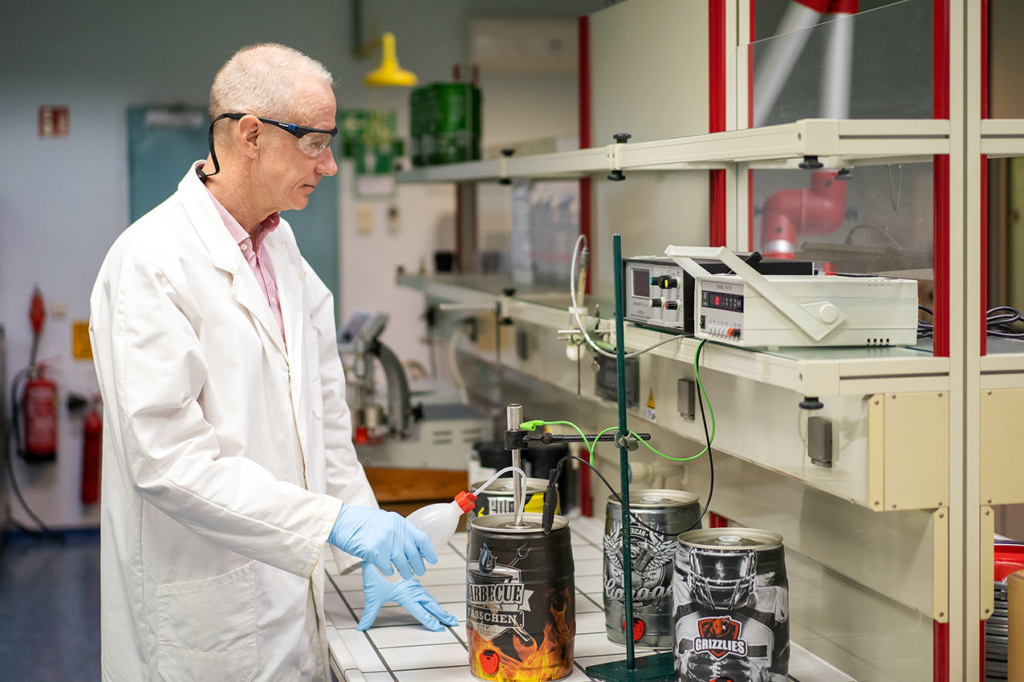
Quality check of the interior painting by means of enamel rating
To what extent did these optimization measures allow the quality of the products to be improved even further?
The fact that the quality improvement measures implemented at Envases have been effective is clearly reflected in our complaint rate, which has been falling for years. Our complaints are now approaching zero. And that is precisely our claim and the goal of all our measures: If a defect should ever occur, we will find it directly at our production site, and at the earliest possible stage of the production process.
What is the biggest challenge in this process?
The biggest challenge is the enormous production volume we have. Many of our machines run around the clock all week. Yet, of course, we need maintenance time windows and the opportunity to try out innovations before rolling them out completely to production. Organizing this is a major challenge. Because, of course, our high quality standards take precedence over everything else. Our cycle performance is very high – a systematic error that remained undetected for a certain period of time would have serious consequences. In this respect, prevention is the be-all and end-all for us in everything we do.
High capacity utilization as the biggest challenge
What is Envases Beverage striving to achieve in this area in the future?
Our goal is clear: We want to continue to ensure the consistently high quality that our customers have come to expect from us. This can only be achieved by continuing to invest in new minikeg technologies and working on sustainable solutions.
Envases can now offer its five-liter keg 100 percent climate-neutral on request. What importance does sustainability have for your company? What efforts are being made to make even more progress in this area?
Envases first received the certificate for the implementation of an environmental management system according to DIN EN ISO 14001 in 2020 and has held this certification ever since. Envases has also been operating a very effective energy management system in accordance with DIN EN ISO 50001 for many years. Both systems have the common goal of demonstrating an annual reduction in the resources used, such as gas and electricity, and monitoring the emissions generated in the factory. The careful use of resources has therefore been at the top of the agenda for Envases for many years.
Personal details: Jasmin Rehn is head of quality management at Envases Öhringen GmbH. Her area of responsibility includes the production sites of the former Huber Packaging Group in Öhringen (Plant I and II), Austria, Great Britain, Hungary and Switzerland. The graduate engineer for production and logistics has been with the company since 2011 and initially worked in product development. In 2016, she moved to quality management.
